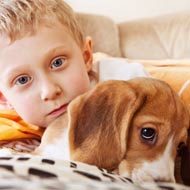Children facing emotional difficulties turn to pets

"These children not only turn to their pets for support when faced with adversity, they do so even more than they turn to their siblings."
Research suggests children coping with emotional difficulties are more likely to confide in their pets than their siblings, the BBC reports.
Matt Cassels, a postgraduate psychiatry researcher, based his work on a 10-year study of 100 UK families, carried out by Cambridge University's Centre for Family Research.
He found that children dealing with issues such as bereavement, illness, parental divorce and instability placed particular importance on their pets.
Speaking to BBC News, Mr Cassels explained: "The data on pet relationships stood out, as it had never occurred to me to consider looking at pet relationships, although I had studied children's other relationships…
"These children not only turn to their pets for support when faced with adversity, they do so even more than they turn to their siblings.
"This is even though they know their pets don't actually understand what they are saying."
Mr Cassels believes the importance of child-pet relationships is currently underestimated and further evaluation is needed to determine how important pets are to us.



 The RCVS has announced a new version of its 1CPD mobile app, with enhanced features for veterinary surgeons and veterinary nurses to record their continuing professional development.
The RCVS has announced a new version of its 1CPD mobile app, with enhanced features for veterinary surgeons and veterinary nurses to record their continuing professional development.